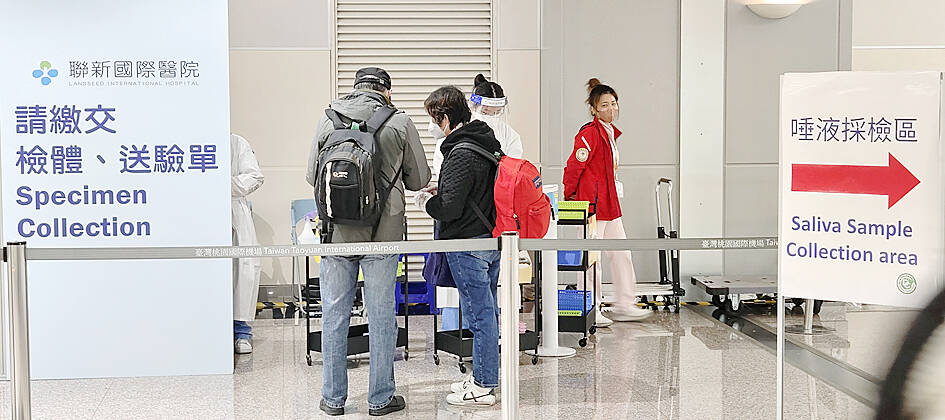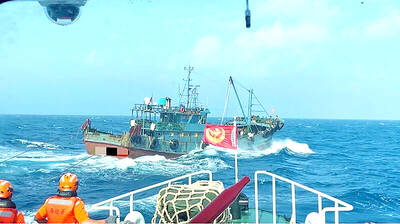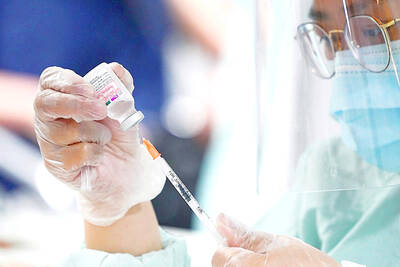The Central Epidemic Command Center (CECC) yesterday said 146 people among 524 travelers from China, or 27.8 percent, tested positive for COVID-19 upon arrival on Saturday.
A temporary testing requirement for all travelers from China was launched on Saturday and the 524 passengers arrived in Taiwan on five direct flights from China.
After undergoing a saliva polymerase chain reaction (PCR) test, they were allowed to return home and practice self-disease prevention while waiting for the test results.

Photo: Tony Yao, Taipei Times
Asked to comment on the test results, Centers for Disease Control Deputy Director-General Chuang Jen-hsiang (莊人祥), who is CECC spokesperson, said the policy had only been imposed for one day and that Taiwan has not allowed Chinese tourists to arrive yet, so it is difficult to determine whether the positivity rate is high or low.
The CECC would select virus samples from the positive cases with a lower cycle threshold value in the PCR test for genome sequencing to identify the virus strains, and it would take about three days for the results to come back, he said, adding that about 20 samples would be selected each day.
About 826 travelers from China were expected to arrive in Taiwan yesterday, he added.
Infectious Diseases Society of Taiwan honorary chairman Huang Li-min (黃立民) said the positivity rate of 27.8 percent indicates that the COVID-19 positivity rate in China is likely very high, and that only selecting 20 samples — about one-seventh of the positive cases — for sequencing is too few and might not detect potential new variants.
He suggested that the CECC conduct genome sequencing on more samples in the initial stage of the testing program, adding that it could reduce the number of samples if no new strain had been detected.
The CECC yesterday also reported 16,524 new local infections — a 16.7 percent increase compared with the previous week — and 26 deaths.
Of the 26 deaths, 12 people were unvaccinated and 13 people were aged 80 or older, while 18 had cancer or other underlying health conditions.
The youngest death was an eight-year-old boy, who did not have a record of underlying health conditions and had received two vaccine shots, in May and June.
The CECC said the boy developed a fever, abdominal pain, vomiting, diarrhea, chills and fatigue on Dec. 25, and he was suffering from convulsions and altered state of consciousness when he was rushed to a hospital the next day, where he tested positive.
The boy was admitted to an intensive care unit, put on a ventilator and given medication, but he died of acute encephalitis and multiple organ failure on Thursday last week, it said.
Additional reporting by Lin Hui-chin

MILITARY BOOST: The procurement was planned after Washington recommended that Taiwan increase its stock of air defense missiles, a defense official said yesterday Taiwan is planning to order an additional four PAC-3 MSE systems and up to 500 missiles in response to an increasing number of missile sites on China’s east coast, a defense official said yesterday. The official, who spoke on condition of anonymity, said that the proposed order would be placed using the defense procurement special budget, adding that about NT$1 trillion (US$32,88 billion) has been allocated for the budget. The proposed acquisition would include launchers, missiles, and a lower tier air and missile defense radar system, they said The procurement was planned after the US military recommended that Taiwan increase

POLITICAL AGENDA: Beijing’s cross-strait Mid-Autumn Festival events are part of a ‘cultural united front’ aimed at promoting unification with Taiwan, academics said Local authorities in China have been inviting Taiwanese to participate in cross-strait Mid-Autumn Festival celebrations centered around ideals of “family and nation,” a move Taiwanese academics said politicizes the holiday to promote the idea of “one family” across the Taiwan Strait. Sources said that China’s Fujian Provincial Government is organizing about 20 cross-strait-themed events in cities including Quanzhou, Nanping, Sanming and Zhangzhou. In Zhangzhou, a festival scheduled for Wednesday is to showcase Minnan-language songs and budaixi (布袋戲) glove puppetry to highlight cultural similarities between Taiwan and the region. Elsewhere, Jiangsu Province is hosting more than 10 similar celebrations in Taizhou, Changzhou, Suzhou,

COGNITIVE WARFARE: Chinese fishing boats transmitting fake identification signals are meant to test Taiwan’s responses to different kinds of perceived incursions, a report said Chinese vessels are transmitting fake signals in Taiwan’s waters as a form of cognitive warfare, testing Taipei’s responses to various types of incursions, a report by the Institute for the Study of War said on Friday. Several Chinese fishing vessels transmitted fake automatic identification system (AIS) signals in Taiwan’s waters last month, with one mimicking a Russian warship and another impersonating a Chinese law enforcement vessel, the report said. Citing data from Starboard Maritime Intelligence, the report said that throughout August and last month, the Chinese fishing boat Minshiyu 06718 (閩獅漁06718) sailed through the Taiwan Strait while intermittently transmitting its own AIS

CHINESE INFILTRATION: Medical logistics is a lifeline during wartime and the reported CCP links of a major logistics company present a national security threat, an expert said The government would bolster its security check system to prevent China from infiltrating the nation’s medical cold chain, a national security official said yesterday. The official, who wished to stay anonymous, made the remarks after the Chinese-language magazine Mirror Media (鏡周刊) reported that Pharma Logistics (嘉里醫藥物流) is in charge of the medical logistics of about half of the nation’s major hospitals, including National Taiwan University Hospital and Taipei Veterans General Hospital. The company’s parent, Kerry TJ Logistics Co (嘉里大榮物流), is associated with the National Committee of the Chinese People’s Political Consultative Conference (CPPCC) and the Chinese People’s Liberation Army (PLA), the